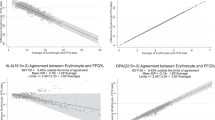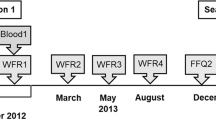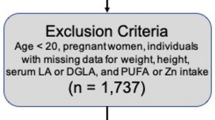Abstract
Objective: To determine dietary carotenoid concentrations using an established and newly developed food frequency questionnaire (FFQ) method, to determine plasma carotenoid concentrations and to determine the relationship between these dietary and plasma variables in 24–45 y and ≥65 y groups.
Design: Descriptive assessment of (FFQ), 7–d estimated records, and plasma carotenoids and their relationships in 24–45 y and ≥65 y groups.
Setting: Free living urban adults in Ireland.
Subjects: Sixty-four volunteers aged 24–45 y and 54 volunteers aged ≥65 y.
Results: β-carotene was the predominant plasma carotenoid, but older groups had lower plasma concentrations of several carotenoids compared to younger groups (P<0.005). β-carotene and lycopene were the major dietary carotenoids reported by estimated records and FFQ. Several estimated record and plasma carotenoid concentrations were positively associated in younger groups but not in older groups. FFQ overestimated dietary carotenoids relative to estimated records (P≤0.05), generally did not reflect estimated record carotenoid concentrations and showed positive associations with plasma carotenoids only in older men. Neither of the dietary methods revealed a positive association between plasma and dietary β-carotene concentrations, whereas β-cryptoxanthin was strongly associated.
Conclusions: Dietary and plasma concentrations of individual carotenoids are documented in young and elderly groups of a European country. Estimated record data reveals positive associations between diet and plasma carotenoids in younger, but not elderly groups. Further work examining diet-plasma relationship in older groups and developing a common FFQ suitable for use in several European countries is required.
Sponsorship: Commission of the European Communities: AAIR Project (AIR2-CT93-0888).
This is a preview of subscription content, access via your institution
Access options
Subscribe to this journal
Receive 12 print issues and online access
$259.00 per year
only $21.58 per issue
Buy this article
- Purchase on Springer Link
- Instant access to full article PDF
Prices may be subject to local taxes which are calculated during checkout
Similar content being viewed by others
Author information
Authors and Affiliations
Rights and permissions
About this article
Cite this article
Carrol, Y., Corridan, B. & Morrissey, P. Carotenoids in young and elderly healthy humans: dietary intakes, biochemical status and diet-plasma relationships. Eur J Clin Nutr 53, 644–653 (1999). https://doi.org/10.1038/sj.ejcn.1600827
Received:
Revised:
Accepted:
Published:
Issue Date:
DOI: https://doi.org/10.1038/sj.ejcn.1600827
Keywords
This article is cited by
-
Association of dietary and plasma carotenoids with urinary F2-isoprostanes
European Journal of Nutrition (2022)
-
Dietary, anthropometric, and lifestyle correlates of serum carotenoids in postmenopausal women
European Journal of Nutrition (2013)
-
The total antioxidant capacity of the diet is an independent predictor of plasma β-carotene
European Journal of Clinical Nutrition (2007)
-
Comparison of plasma biomarkers with dietary assessment methods for fruit and vegetable intake
European Journal of Clinical Nutrition (2003)
-
Low-dose supplementation with lycopene or β-carotene does not enhance cell-mediated immunity in healthy free-living elderly humans
European Journal of Clinical Nutrition (2001)



